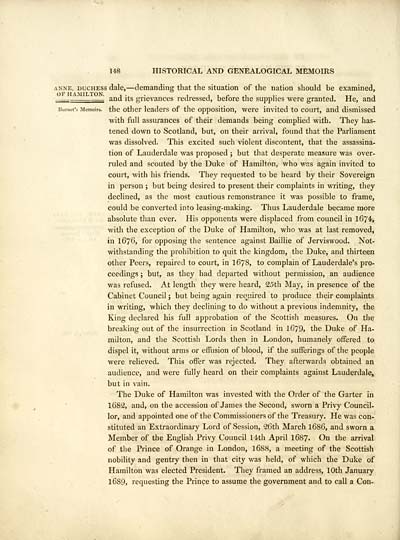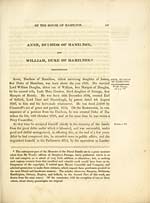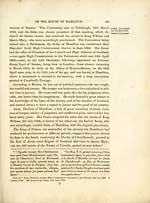Historical and genealogical memoirs of the House of Hamilton
(158) Page 148
Download files
Complete book:
Individual page:
Thumbnail gallery: Grid view | List view

148 HISTORICAL AND GENEALOGICAL MEMOIRS
anne, duchess dale, — demanding that the situation of the nation should be examined,
and its grievances redressed, before the supplies were granted. He, and
Burnet's Memoirs, the other leaders of the opposition, were invited to court, and dismissed
with full assurances of their demands being complied with. They has-
tened down to Scotland, but, on their arrival, found that the Parliament
was dissolved. This excited such violent discontent, that the assassina-
tion of Lauderdale was proposed ; but that desperate measure was over-
ruled and scouted by the Duke of Hamilton, who was again invited to
court, with his friends. They requested to be heard by their Sovereign
in person ; but being desired to present their complaints in writing, they
declined, as the most cautious remonstrance it was possible to frame,
could be converted into leasing-making. Thus Lauderdale became more
absolute than ever. His opponents were displaced from council in I6j4i,
with the exception of the Duke of Hamilton, who was at last removed,
in I676, for opposing the sentence against Baillie of Jerviswood. Not-
withstanding the prohibition to quit the kingdom, the Duke, and thirteen
other Peers, repaired to court, in I678, to complain of Lauderdale's pro-
ceedings ; but, as they had departed without permission, an audience
was refused. At length they were heard, 25th May, in presence of the
Cabinet Council ; but being again required to produce their complaints
in writing, which they declining to do without a previous indemnity, the
King declared his full approbation of the Scottish measures. On the
breaking out of the insurrection in Scotland in 1679, the Duke of Ha-
milton, and the Scottish Lords then in London, humanely offered to
dispel it, without arms or effusion of blood, if the sufferings of the people
were relieved. This offer was rejected. They afterwards obtained an
audience, and were fully heard on their complaints against Lauderdale,
but in vain.
The Duke of Hamilton was invested with the Order of the Garter in
1682, and, on the accession of James the Second, sworn a Privy Council-
lor, and appointed one of the Commissioners of the Treasury. He was con-
stituted an Extraordinary Lord of Session, 26th March 1686, and sworn a
Member of the English Privy Council 14th April I687. On the arrival
of the Prince of Orange in London, 1688, a meeting of the Scottish
nobility and gentry then in that city was held, of which the Duke of
Hamilton was elected President. They framed an address, 10th January
1689, requesting the Prince to assume the government and to call a Con-
anne, duchess dale, — demanding that the situation of the nation should be examined,
and its grievances redressed, before the supplies were granted. He, and
Burnet's Memoirs, the other leaders of the opposition, were invited to court, and dismissed
with full assurances of their demands being complied with. They has-
tened down to Scotland, but, on their arrival, found that the Parliament
was dissolved. This excited such violent discontent, that the assassina-
tion of Lauderdale was proposed ; but that desperate measure was over-
ruled and scouted by the Duke of Hamilton, who was again invited to
court, with his friends. They requested to be heard by their Sovereign
in person ; but being desired to present their complaints in writing, they
declined, as the most cautious remonstrance it was possible to frame,
could be converted into leasing-making. Thus Lauderdale became more
absolute than ever. His opponents were displaced from council in I6j4i,
with the exception of the Duke of Hamilton, who was at last removed,
in I676, for opposing the sentence against Baillie of Jerviswood. Not-
withstanding the prohibition to quit the kingdom, the Duke, and thirteen
other Peers, repaired to court, in I678, to complain of Lauderdale's pro-
ceedings ; but, as they had departed without permission, an audience
was refused. At length they were heard, 25th May, in presence of the
Cabinet Council ; but being again required to produce their complaints
in writing, which they declining to do without a previous indemnity, the
King declared his full approbation of the Scottish measures. On the
breaking out of the insurrection in Scotland in 1679, the Duke of Ha-
milton, and the Scottish Lords then in London, humanely offered to
dispel it, without arms or effusion of blood, if the sufferings of the people
were relieved. This offer was rejected. They afterwards obtained an
audience, and were fully heard on their complaints against Lauderdale,
but in vain.
The Duke of Hamilton was invested with the Order of the Garter in
1682, and, on the accession of James the Second, sworn a Privy Council-
lor, and appointed one of the Commissioners of the Treasury. He was con-
stituted an Extraordinary Lord of Session, 26th March 1686, and sworn a
Member of the English Privy Council 14th April I687. On the arrival
of the Prince of Orange in London, 1688, a meeting of the Scottish
nobility and gentry then in that city was held, of which the Duke of
Hamilton was elected President. They framed an address, 10th January
1689, requesting the Prince to assume the government and to call a Con-
Set display mode to:
![]() Universal Viewer |
Universal Viewer | ![]() Mirador |
Large image | Transcription
Mirador |
Large image | Transcription
Images and transcriptions on this page, including medium image downloads, may be used under the Creative Commons Attribution 4.0 International Licence unless otherwise stated. ![]()
| Histories of Scottish families > Historical and genealogical memoirs of the House of Hamilton > (158) Page 148 |
|---|
| Permanent URL | https://digital.nls.uk/95391683 |
|---|
| Description | A selection of almost 400 printed items relating to the history of Scottish families, mostly dating from the 19th and early 20th centuries. Includes memoirs, genealogies and clan histories, with a few produced by emigrant families. The earliest family history goes back to AD 916. |
|---|

